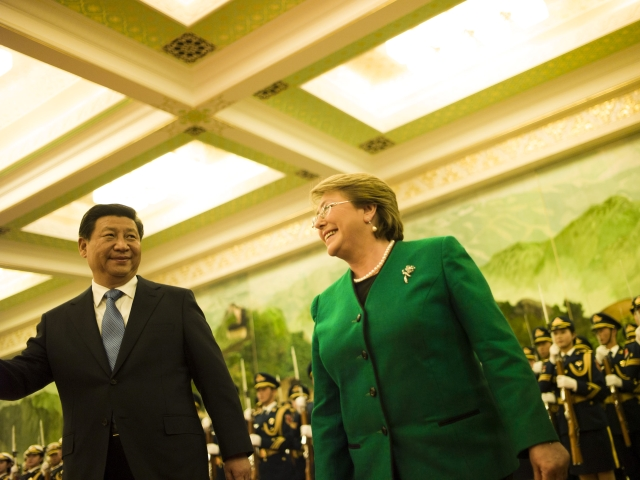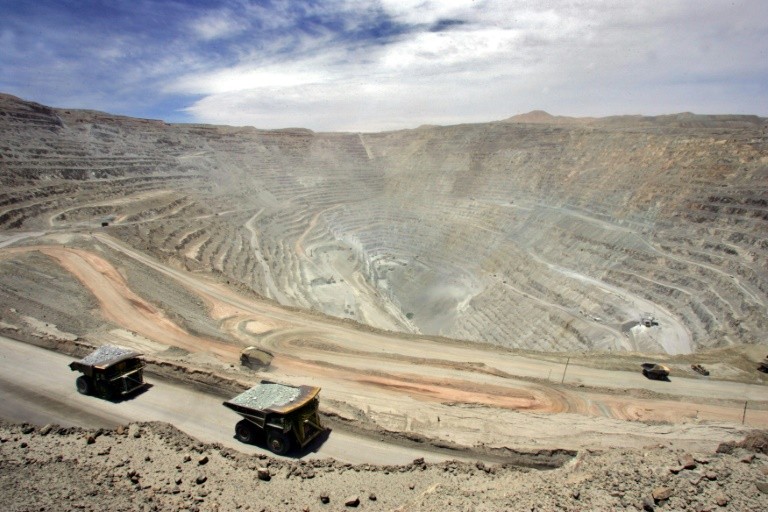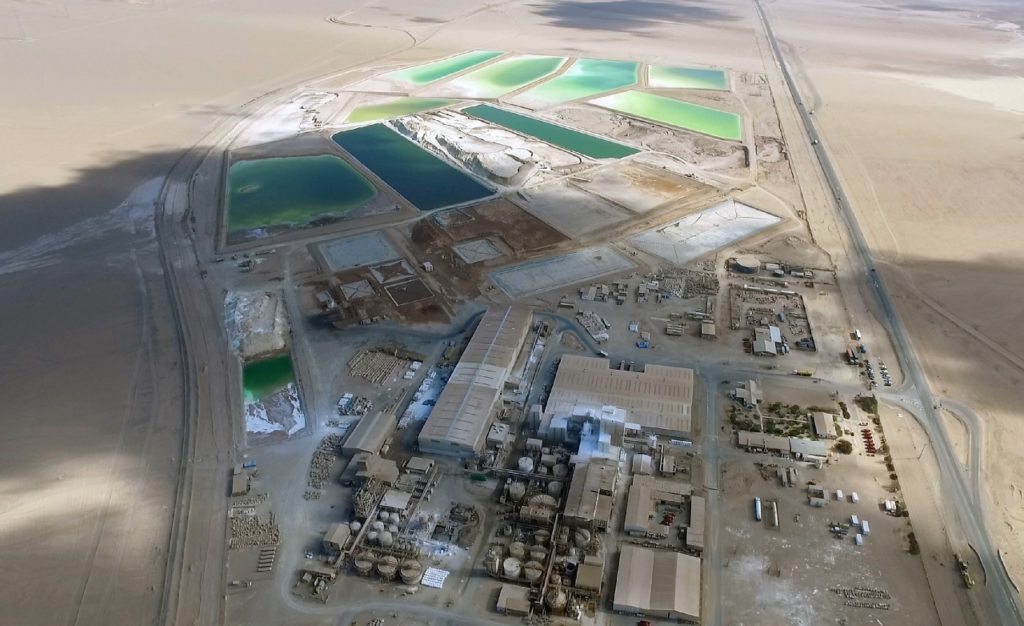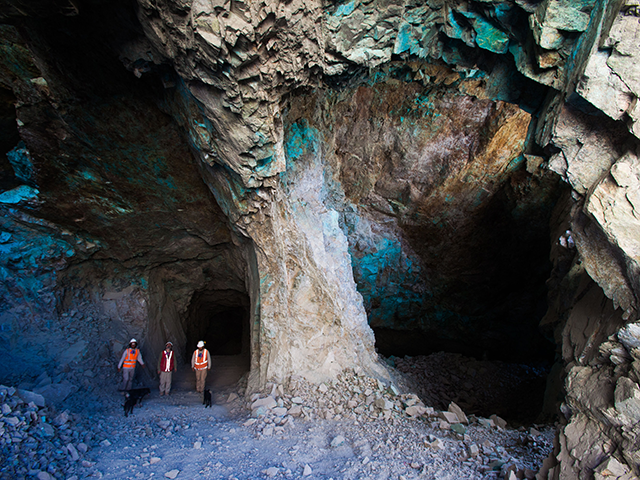China has spent much of the past two decades cornering Chile’s lucrative copper and lithium markets, potentially making it impossible for nearly any other country to establish a formidable “green” economy, as both resources are pivotal in the making of electric vehicles.
China has maintained a continued interest in Chile’s abundance of the two precious materials, slowly gaining more foothold in the nation’s industries and its resources over the past 15 years following the free trade treaty signed by both countries in 2005.
Chile is currently the world’s top copper producer and the world’s second largest producer of lithium, having lost the first spot to Australia in 2016. In 2019, Chile represented 28 percent of the world’s copper market share and 23 percent of the world’s lithium market share.
China is the top destination of Chile’s exports. In 2021, 83.9 percent of Chile’s exports to China were minerals such as copper, other non-mineral exports to China include fruits, wine, and seafood.
Chile currently holds over 50 percent of the world’s lithium reserves, an indispensable resource in the manufacturing of batteries for electric vehicles alongside copper. Copper is also a highly sought resource that China, the world’s top importer of the mineral, is continuously starved for, amounting to half of the world’s total copper consumption and the world’s largest lithium consumer. Therefore, it’s no surprise that China sees strategic value in securing both of these resources from Chile’s abundant reservoirs — a feat they’ve been able to achieve thanks to lax behavior and concessions on behalf of Chilean politicians through agreements that have favored China over Chile.
Chile almost sold away one of the nation’s copper yields to the Chinese Communist Party before the mine deposit had even begun producing copper.
During the presidency of socialist Ricardo Lagos (2000-2006), the Chilean state-owned CODELCO copper mining company signed commercial agreements with the Chinese state-owned “China Minmetals Corporation” between 2005 and 2006 that granted Minmetals 24 ownership of the Gabriela Mistral copper mine (colloquially known as the “Gaby” mine) that was, at the time, under construction with a 2008 inauguration date.
The sale was postponed until Chinese pressure to seal the deal increased in 2008. Socialist President Michelle Bachelet — now the head of the U.N. Human Rights Office — traveled to China in 2008, where she affirmed that her government would respect the agreement between CODELCO and Minmetals after continuous backlash from Chilean citizens as well as from copper workers, who opposed any sale of the mine’s property and threatened to go on strike to protest the sale of the copper mine to Chinese interests.

Then-Chilean President Michelle Bachelet (R) and Chinese President Xi Jinping inspect Chinese paramilitaries at the Great Hall of the People on November 12, 2014 in Beijing, China. (Fred Dufour-Pool/Getty Images)
The agreement was highly beneficial to China, as it granted Minmetals the ability to elevate their stake to up to 49 percent. Despite Chile being able to keep 51 percent ownership of the mine, China would have effectively had a majority control of the mine total production, as China paid $550 million in advance for 55,750 tons of copper per year over fifteen years. Therefore, the agreement would have left Chile with a minority share of the mine’s total yearly production.

The Chuquicamata site in the Atacama desert of northern Chile is considered to hold the largest open pit copper deposit in the world, measuring five by three kilometers and one kilometer deep. (AFP/MARTIN BERNETTI)
The sale of the “Gaby” mine to China was ultimately suspended in September 2008. In 2014, Juan Villarzú, who was the president of CODELCO at the time the Gaby mine agreements were signed with China, admitted to the Chilean congress that the negotiation was a net negative to Chile’s interests.

This handout file picture by SQM (Chemical and Mining Society of Chile) taken on December 26, 2016 shows an aerial view of the processing plant of the lithium mine, in Del Carmen salt flat, in the Atacama Desert, northern Chile. (AFP)
Former self-proclaimed center-right president Sebastian Piñera drew Chile closer to China and its Belt and Road Initiative. Piñera’s friendly and receptive approach to China allowed Chinese companies to cement further footholds in the South American nation.
In 2019, Pinera traveled with an official delegation to court Chinese investment in the country and to promote Chile as a gateway for China into Latin America.
“We want to transform Chile into a true business center for Chinese companies. So that you can, from Chile, also reach all of Latin America,” Piñera stated during a meeting as part of his official visit to Beijing.
The Chinese Tianqi Lithium Corp spent $4 billion in 2018 to purchase a 24 percent stake in the Chilean Sociedad Química y Minera de Chile (SQM) company from the Canadian Nutriem company. SQM controls and exploits the world’s largest lithium reservoir, located in the northern Chilean region of Atacama after the Chilean Tribunal for the Defense of Free Competition (TDLC), an antitrust court, authorized the transaction.
In January 2022, Piñera’s administration granted both the Chinese BYD Chile SpA company and the local Operaciones Mineras del Norte S.A. contracts to extract up to 80,000 tons of metallic lithium per year over 20 years amidst a controversial licitation process, as Piñera was two months away from handing over the presidency to leftist Gabriel Boric.
Two days later, a Chilean appeals court ordered to suspend both contracts after the governor of the Copiapo region and local indigenous communities filed the appeal citing the environmental impact it would cause on the region and its inhabitants.
Chile’s current far-left president, Gabriel Boric, who began his presidency in March 2022 sported an environmentalist and pro-green energy message as part of his presidential campaign promises. Recently, Boric announced the creation of a Chilean National Lithium company to redouble Chile’s lithium exports while also announcing plans to reinforce Chile’s National copper industry.
His plans to increase Chile’s lithium exports in the name of green energy is at odds with his environmentalist message, as an increased exploitation and mining of lithium in the name of green energies and fighting against climate change could end up causing further harm to his own nation’s environment despite Boric having recently remarked that China, whom Chile exports its copper and lithium to, must be held responsible for the preservation of the environment.
At its current production levels, Chile’s lithium industry has already caused negative effects on the desert region of Atacama and its sparse water resources, depriving local indigenous communities of access to water.
China’s grip on Chile is not limited to just copper and lithium, but other sectors of the country as well.
The Chinese State Grid Corporation of China (SGCC) bought all of the American Sempra Energy’s interests in Chile, including its 100-percent stake in the Chilean Chilquinta Energía S.A. electrical company in 2020. State Grid also bought 96.04 percent of Chile’s Compañía General de Electricidad (CGE), Chile’s largest electrical company for 2.6 billion Euros, effectively putting 57 percent of Chile’s electrical industry clientele in Chinese hands.
China’s Joyvio group bought the Chilean Australis Seafood for $920 million in 2019, giving them a hand in Chile’s salmon industry, the country’s stop food export and second largest export after copper.
Christian K. Caruzo is a Venezuelan writer and documents life under socialism. You can follow him on Twitter here.


COMMENTS
Please let us know if you're having issues with commenting.